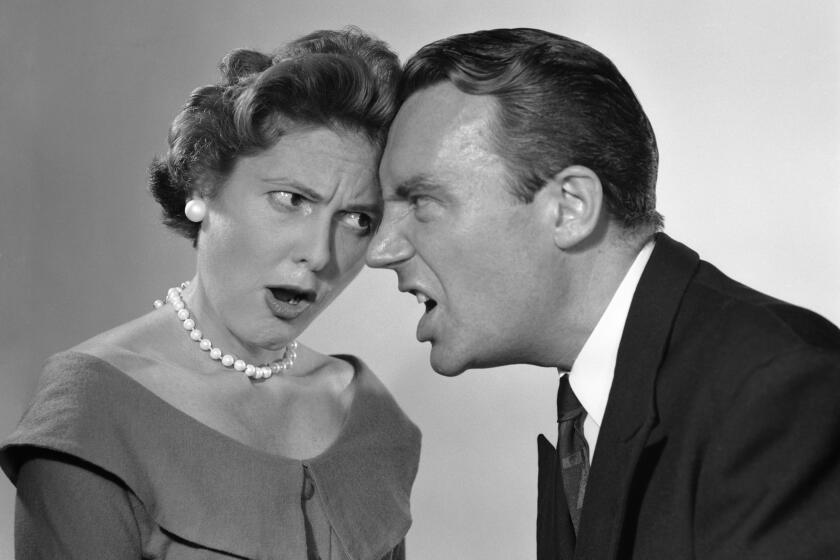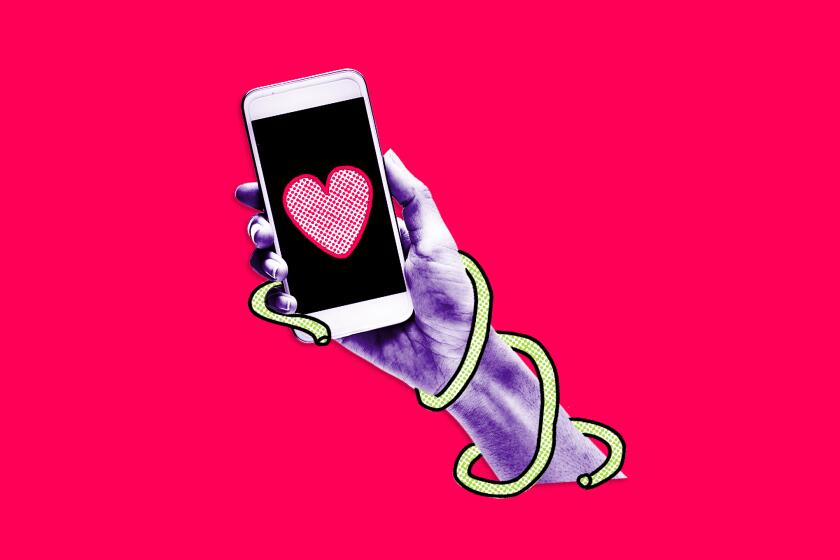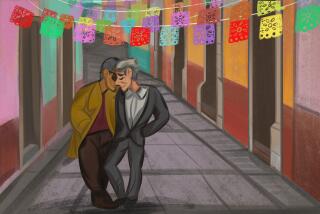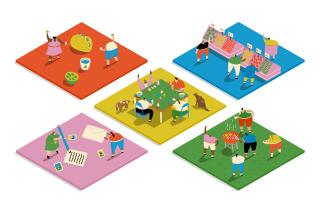L.A. Affairs: How 20 weeks of quarantine healed my marriage
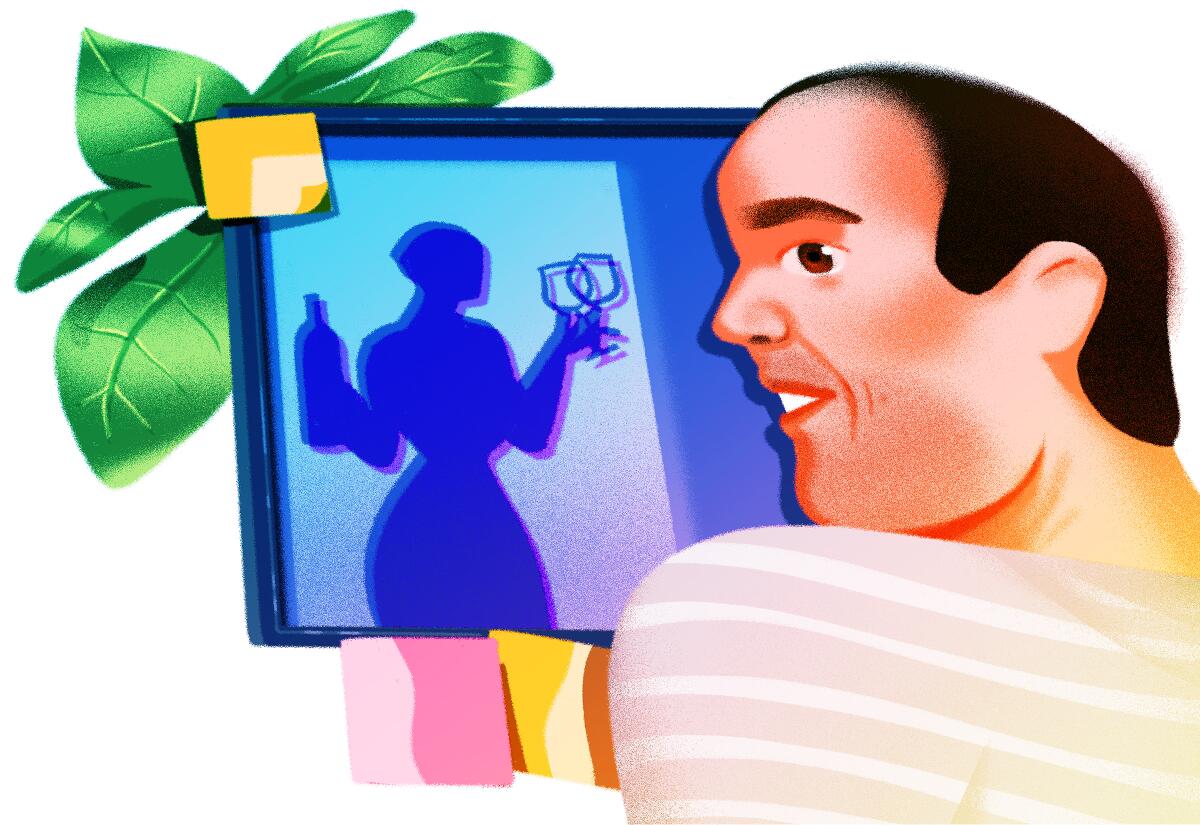
- Share via
“Don’t stand, don’t stand so, don’t stand so close to me…” Daniel sang along with Sting while I was preparing a dinner to celebrate our 12th wedding anniversary, back in March. We laughed half-heartedly at the lyrics. It would have seemed like an amusing choice for a couple who can joke about their marriage or about each other had it not been for the then freshly instituted coronavirus shutdown hanging over each gesture and statement.
The day before, I had taken our teenage son to the doctor with what seemed like cold or flu symptoms. The physician assistant who examined him assured us it was just flu. I was skeptical about her level of expertise — she seemed so young — and found myself quietly questioning her diagnosis. What if it is IT? I thought. Later, I shared my worry with my husband.
IT being coronavirus.
I could not bring myself to pronounce the word.
The shutdown situation can be uniquely hard on married couples. Here’s how to help your marriage survive coronavirus.
After picking up my son’s prescription, we decided to take precautions at home. I cleaned and disinfected in a frenzy of bleach and Lysol. My son stayed in his room for almost a week as he recovered, coming out only to eat. When he did emerge, my husband would retreat to our bedroom, and I moved my work headquarters into the guest room. We all slept in separate rooms for a month, and we moved through the house giving each other plenty of space.
But on that anniversary night, after my son went to bed, Daniel and I did the unthinkable: sat down with a bottle of red wine, cheese and crackers for our anniversary dinner. Between us, I placed a picture of the two of us hugging, taken years ago at a Christmas party. This was unthinkable because my husband rarely drinks. And we never seem to sit down, just the two of us, to talk and enjoy a glass of wine.
As we poured wine and ate cheese, we leafed through our wedding album. Some pictures made us laugh; some made me cry. There was one picture of my parents at our wedding in 2008 in Romania, wearing faint smiles. There was sadness in their eyes, for their youngest daughter would soon be leaving for California and an uncertain future.
There are at least three types of relationship issues amid the shutdown, and recognizing them may be our best protection against breakups and divorce.
I understood that uneasy feeling as we tried to celebrate our anniversary against the backdrop of the coronavirus shutdown. I asked my husband: “Daniel, what’s gonna come of us?”
“I don’t know,” he said predictably. I say “predictably” because, when I ask Daniel any question, his first answer is “I don’t know,” since he is usually scrolling through his phone and does not want to interact. This time, however, he was not looking at his phone. And yet it was the only real answer, because who can know where this pandemic will take us. Will we make it through? Will we get sick? Is it just a matter of time? Will life ever be normal again?
Daniel and I met through family in 2007 and kept a long-distance relationship — he in California, I in Romania — for a year, during which we spent only two separate weeks in person. He proposed in that second week. Our love grew and stayed alive thanks to technology: Yahoo Instant Messenger and video camera conversations. Our communication, even though we were more than 6,000 miles apart, was daily and extensive. Technology was a blessing.
L.A. dating coach Damona Hoffman tackles dating and relationship questions on her weekly podcast, “Dates & Mates.” Today she shares answers to the most common questions about love in the time of coronavirus.
Once in California, with the introduction of more technology into everyone’s lives, even though we lived under the same roof and were just a couple of feet apart, the communication between us faded and was replaced by a nightly silence, disrupted at times by my husband’s reaction to whatever sports accomplishment was taking place on TV. Technology had turned into a curse.
But in spring 2020, under quarantine, and especially in the first weeks, we began talking to each other again, just like in the beginning, only in person.
Daniel would come to my office door to ask how I was doing. I would go downstairs to get water or a snack and to ask him how he was doing. We would share the latest news we’d heard, joke about working in the building, then go back to our desks, only to reunite later, for more talk. It felt unusual. And interesting.
After a few days, I remarked to Daniel that the frequency of our communication had increased to unprecedented levels. How many times have we heard the word “unprecedented” since the start of the quarantine? It was now our word too. I wondered aloud how long we would be able to keep it going.
“I don’t know,” said Daniel, this time with a sense of worry in his voice.
Life continues to slow for us, and technology has become a blessing once again. We are able to work and keep in touch with our loved ones, 50 miles or thousands of miles away.
We have come to realize that in 12 years of marriage, we have not been physically under the same roof as much as we have since March. We look at each other in a different way. We are no longer in a rush to get out the door to work or to anywhere else. I am no longer under pressure to make dinner by a certain time. We eat whenever it is ready. We take our time.
We lose our temper and patience sometimes, when we prompt each other yet again to wash hands because “you touched your nose!”
Yet we are more forgiving because we don’t know.
While I pray to wake up in the morning to a virus-free world, I also pray that my husband and I keep this newly found bond and communication, with wine nights and sunny afternoons on the balcony, like two old women in the Romanian countryside, sitting on a bench by the front gate and gossiping about the passersby.
The author is an administrative assistant and president of her Toastmasters Club.
Straight, gay, bisexual, transgender or nonbinary — L.A. Affairs chronicles the search for love in and around Los Angeles, and we want to hear your story. The story you tell has to be true, and you must allow your name to be published, We pay $300 for each essay we publish. Email us at LAAffairs@latimes.com. You can find submission guidelines here.
More to Read
Sign up for The Wild
We’ll help you find the best places to hike, bike and run, as well as the perfect silent spots for meditation and yoga.
You may occasionally receive promotional content from the Los Angeles Times.
